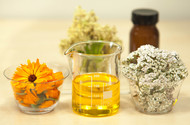Natural Alternatives to Toxic Antibacterials
Feb 23rd 2019
 One need only glance at the personal care and beauty aisles of any department store to see multiple label references touting "antibacterial" capabilities. The same can be said about the household cleaning aisles. The problem with some of these antibacterial agents is we sacrifice safety for effectiveness.
One need only glance at the personal care and beauty aisles of any department store to see multiple label references touting "antibacterial" capabilities. The same can be said about the household cleaning aisles. The problem with some of these antibacterial agents is we sacrifice safety for effectiveness.
Triclosan - Phased Out
One such toxic antibacterial agent that is quickly being phased out is triclosan. This chemical's structure is similar to Agent Orange. Agent Orange is the infamous and highly toxic herbicide that was utilized to kill battleground jungle foliage during the Vietnam War. Its widespread use was later linked to high rates of birth defects, neurological conditions and cancer. The longer and more intense one's exposure, it seemed the higher their risk was.
This is just one chemical of questionable safety for skin application. Ethyl alcohol is a common ingredient in hand sanitizer which has a questionable safety profile. It is linked to reproductive toxicity, cancer and birth defects. Another antibacterial agent called Benzalkonium Chloride (BAC) is used in sanitizing products. It is linked to cancer, allergies and organ toxicity. So, how can you get protection from harmful and destructive bacteria WITHOUT sacrificing safety?
Nature's Antibacterial : Essential Oils
The good news is there is a popular and ever expanding world of research into the use of essential oils that work just as well if not better. Essential oils are the “essence” of various plants that are distilled down into their purest form. These plant-pressed oils contain powerful constituents that contain natural chemical antibacterial agents.
They often contain organisms that are very potent in fighting bacteria. Not only that, some of them also act as anti-fungal agents and even as natural antibiotics. Related: Should You Avoid Petroleum in Your Personal Care Routine?
One such essential oil is pressed from the thyme plant. You may know this herb as a savory seasoning used in recipes like rotisserie chicken. However, thyme oil has recently been proven to be an even more potent antibacterial agent than many chemicals commonly used in soaps and hand cleansers.
Another essential oil that has strong antibacterial properties is lavender. Lavender is mostly known as the “relaxing” oil and is often used to calm the nerves. It is often overlooked as an antibacterial agent.
Lavender is used abundantly in the natural healing community for its ability to soothe and calm the skin (and senses) while also killing bacteria. Studies have shown that simply inhaling pure lavender oil has a calming effect on the nervous system.
Essential oils of rosemary and peppermint are also good antibacterial agents. Peppermint smells wonderful, but may be a bit harsh for use on human skin in large quantities or undiluted. It makes an excellent addition to household cleaners for its germ-killing qualities and clean, fresh scent.
Many of the citrus essential oils are excellent at killing bacteria. Essential oils or orange, lemon, lemongrass, grapefruit and lime all possess antibacterial properties and sometimes even anti-fungal or antiviral properties.
Common Household Items
Several items most people would be able to find in their pantry at any given time also work well as antibacterial agents. Most types of vinegar are great at killing surface bacteria. When diluted in water vinegar is gentle enough to use on most furniture and even may be used topically on the skin if desired.
Many find the smell of vinegar to be unpleasant. It is often recommended to not only dilute it with distilled or purified water but also to add some more fragrant essential oils. Citrus oils can be especially complementary to vinegar. They also help to soften the harsh scent vinegar tends to have.
Lemon juice is also an excellent natural antibacterial agent. Diluted lemon juice can be an excellent and very economical addition to household cleaners, depending on what type of surface you’re cleaning. Some people even use it as an additive to natural skin astringents.
Hot water is one of the best ways to kill bacteria. It is a simple and readily available way to help rid surfaces of bacteria and other surface contaminants. Of course, it can be used in conjunction with any of the other aforementioned ingredients to make an inexpensive yet potent natural antibacterial cleaner.

